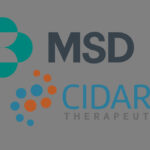November 13, 2025
2 min read
The FDA approved ziftomenib for adult patients with relapsed or refractory acute myeloid leukemia with a susceptible nucleophosmin 1 mutation.
This indication for ziftomenib (Komzifti, Kura Oncology), an oral menin inhibitor, applies to adults who do not have satisfactory alternative treatment options.

The FDA approved ziftomenib for adult patients with relapsed or refractory acute myeloid leukemia with a susceptible nucleophosmin 1 mutation.
“Komzifti addresses a critical need for adult patients with R/R NPM1-m AML, many of whom are older and unable to tolerate intensive chemotherapy or transplant,” Eunice Wang, MD, chief of leukemia service and professor of oncology at Roswell Park Comprehensive Cancer Center, said in a Kura press release. “The clinical data demonstrate deep and durable responses with a manageable safety profile … This approval equips physicians with a new oral therapy to integrate into care and improve outcomes for this vulnerable patient population.”
The FDA based this approval on data from the single-arm KOMET-001 trial that assessed efficacy of the agent among 112 adult patients with relapsed or refractory AML with NPM1 mutations. Median follow-up was 4.2 months.
Data showed a complete remission rate/complete remission rate with partial hematologic recovery of 21.4% (95% CI, 14.2%-30.2%). The median duration of complete remission rate/complete remission rate with partial hematological recovery duration reached 5 months (95% CI, 1.9-8.1), and the median time to first relapse in patients who achieved a complete remission rate/complete remission rate with partial hematological recovery was 2.7 months (range, 0.9-15).
Of note, 88% of patients achieved complete remission rate/complete remission rate with partial hematological recovery within 6 months of initiating treatment with ziftomenib.
Fourteen (21.2%) of the 66 patients dependent on red blood cell and/or platelet transfusions at baseline became independent of those transfusions during any 56-day postbaseline period, according to the release.
Additionally, 12 (26.1%) of the 46 patients independent of transfusions at baseline remained transfusion independent during this period.
Common adverse events that occurred in at least 20% of patients included an increase in aspartate aminotransferase, infection without an identified pathogen, decreases in potassium and albumin, hemorrhage, diarrhea, nausea, fatigue, edema, bacterial infection and musculoskeletal pain.
Prescribing information includes warnings and precautions for differentiation syndrome, QTc interval prolongation and embryo-fetal toxicity. Two fatal cases of differentiation syndrome occurred during the trial.
The FDA-recommended dose for patients is 600 mg administered orally once daily until disease progression or unacceptable toxicity.











